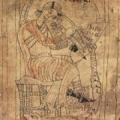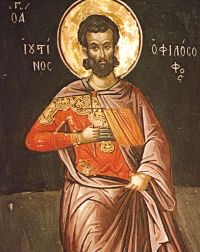102 - Please Accept Our Apologies: the Greek Church Fathers
Irenaeus, Clement, and Justin Martyr struggle to define Christian orthodoxy and claim philosophy back from the Greeks.
Themes:
Primary texts
• Clement of Alexandria, Stromateis Books 1-3, trans. J. Ferguson (Washington DC: 1991).
• Irenaeus, Against Heresies: see extracts in R.M. Grant, Irenaeus of Lyons (London: 1997).
• Justin Martyr, Dialogue with Trypho, trans. T.B. Falls (Washington DC: 2003).
Secondary literature
• M. Edwards, “Gnostics and Valentinians in the Church Fathers,” Journal of Theological Studies 40 (1989), 26-47.
• R.M. Grant, Gnosticism and Early Christianity (New York: 1966).
• R.M. Grant, Greek Apologists of the Second Century (Philadelphia: 1988).
• S.R.C. Lilla, Clement of Alexandria (Oxford: 1971).
• E. Osborne, Clement of Alexandria (Cambridge 2005).
• H.B. Timothy, The Early Christian Apologists and Greek Philosophy (Assen: 1973).







Comments
Irenaeus
Hi Peter -
Thank you for keeping up this excellent podcast.
In this episode you commented that some of the early church fathers' views have regained popularity with modern apologists, and that is certainly something I recognized in this episode.
In particular you suggested that Irenaeus disagreed with the Gnostic doctrine that some souls are by nature good and some by nature evil. Instead, he said that God gives us free will so that we can become good or evil and deserving of reward or punishment.
I have heard this recently and it just sounds as if the problem has been moved sideways. If all souls are created equal and all are given the same chances then they would all make the same decisions. If some souls choose good and some evil, then surely it means they either start out with differences (for example some might have a strong will which leads them to good and some a weak will which leads them to evil) or they must have different experiences (some may be presented with more difficult moral challenges).
Having strong or weak souls created by God doesn't sound any better than having good or evil souls, and presenting different souls with different levels of temptation doesn't sound like cosmic justice either.
Did Irenaeus or the other fathers ever dig deeper than that?
Thanks again,
Jon
In reply to Irenaeus by Jon
Irenaeus
Hi Jon,
Thanks, that's a great question. Firstly for those who are curious, I would associate the modern use of this idea most strongly with John Hick. See:
J. Hick Evil and the God of Love (London: 1966).
J. Hick, “An Irenaean Theodicy,” in S.T. Davis (ed.), Encountering Evil: Live Options in Theodicy (Edinburgh: 1981).
Now to answer your question, you should catch the next episode, on Origen. He does dig deeper, by supposing that the souls only ever come to be embodied in the first place through free choice. When they start existence they are pure minds, which are then led to different choices by their thoughts. I think this pushes the solution as far as it can go: you have to buy into the idea that minds have an irreducible tendency to vary from one another by their choices, which affect their thoughts and vice-versa (Origen can add that since these minds are created, they are metaphysically subject to change and variation, unlike God). Maybe not a complete solution but it shows he has grasped the problem you worry about.
Thanks again,
Peter
In reply to Irenaeus by Peter Adamson
Irenaeus continued
Hmmm... It sounds like I'll have to file this under "ineffable" - but at least I know I haven't missed anything obvious
Thanks Peter
- Jon
In reply to Irenaeus continued by Jon
File under ineffable
Presumably the label on that file is blank. But seriously: I just wanted to point out that this is an instance of a general problem with free will. If we think that freedom is incompatible with causal determination, then there is a risk that every free action (even ones more trivial than what Irenaeus and Origen are talking about) will be either (a) uncaused and therefore apparently random or unexplained, or (b) somehow caused and therefore not free after all. I'm not saying the problem is insoluble, but it is still very much with us.
In reply to Irenaeus by Jon
Good and evil
"Instead, he said that God gives us free will so that we can become good or evil and deserving of reward or punishment."
Hi Jon,
You pose an interesting question, and I daresay for innumerable people.
Having lived through hard times and relatively easy times for 62 years in different countries, I have witnessed many different human beings. Yet, the decent and good appear to be in the majority.
Is the 'soul' as a separate entity from the body similar to the brain and the mind?
Is there deep down a 'goodness' that needs to nurtured, and if not nurtured; as with a field not weeded, the weeds destroy the food (good)crop?
Listening to other broadcasts, I am also wondering when does the soul enter into us. Is it at conception, and if so what creates it?
It is not as if an angel is somewhere in cyber space with 'souls' on a rack or shelf to hand out. Does each soul contain elements of its genetic ancestors as the body does?
In reply to Good and evil by Declan J Foley
free will, good and evil
Thanks Decian
> Is there deep down a 'goodness' that needs to nurtured
> Does each soul contain elements of its genetic ancestors as the body does?
Both of those points would seem to deny free will as they put our destiny outside our own control.
- Jon
In reply to free will, good and evil by Jon
Free will
Thank you Jon,
I appreciate, and find your, reply most interesting.
Declan
thanks
Hi Peter
i am on 102 podcast .started at one .... pretty good after only three weeks !!! I am recently retired artist so i play them while i work in the studio. Have enjoyed Religeon ,Philosophy ,psychology and literature my whole life . Nice to have the gaps filled in , its like reading the whole book not just certain chapters . Very much applaud your efforts . I feel university teaching should be better formed not just in philosophy but in all areas so the teachings are relevant to stages in ones life rather than a compressed format .. Again i thank you for the great work .
In reply to thanks by Wayne Burt
Art
Wow, that is pretty quick listening! That's fantastic, I hope the podcasts give you some inspiration while you work.
DESEO RECIBIR LOS PODCAS EN…
DESEO RECIBIR LOS PODCAS EN ESPAÑOL....COMO HAGO?
In reply to DESEO RECIBIR LOS PODCAS EN… by yanet
en Español
I was actually contacted not long ago by someone who wanted to translate at least some of them into Spanish; if that happens I will announce it here and on social media.
Add new comment